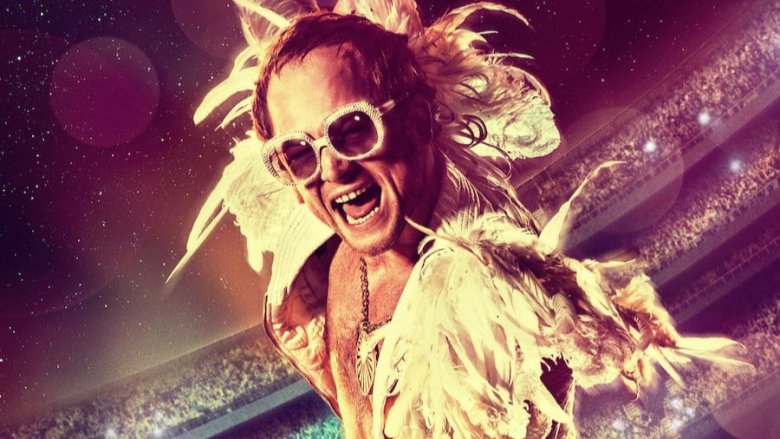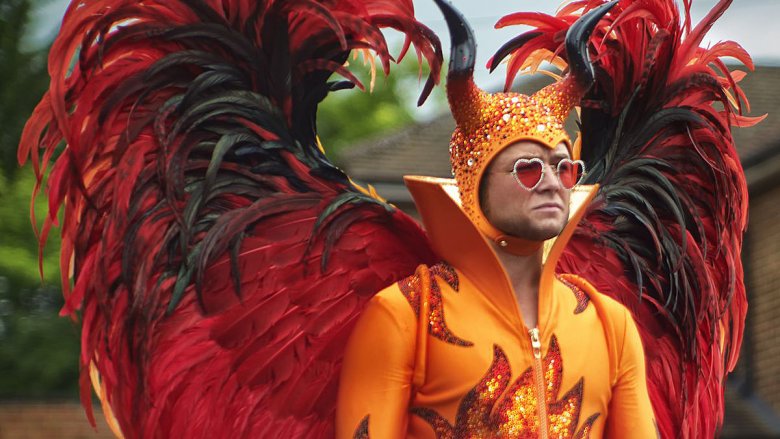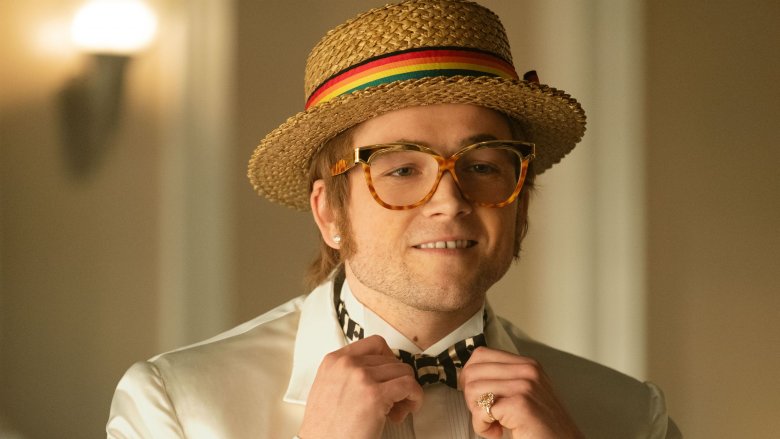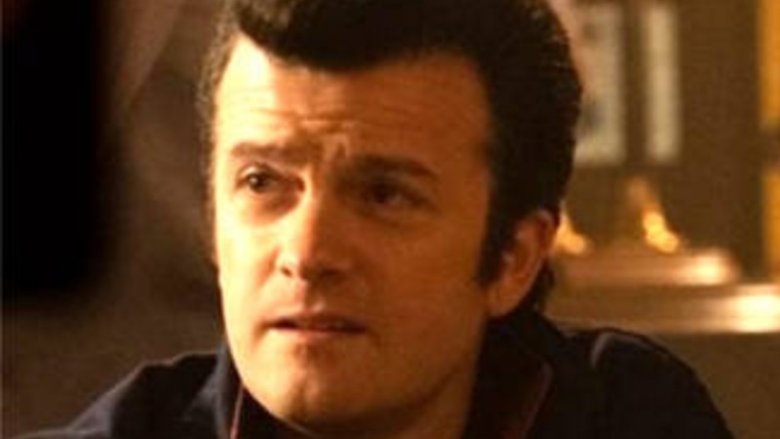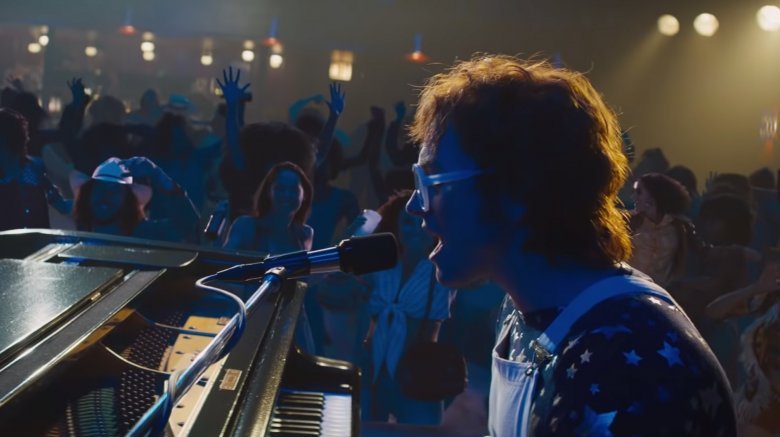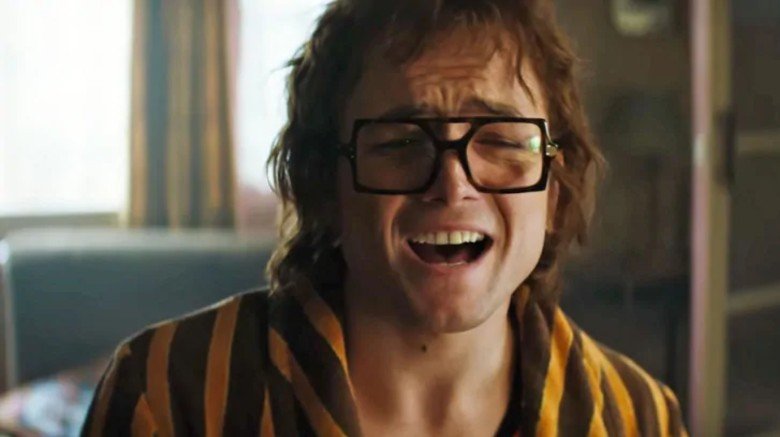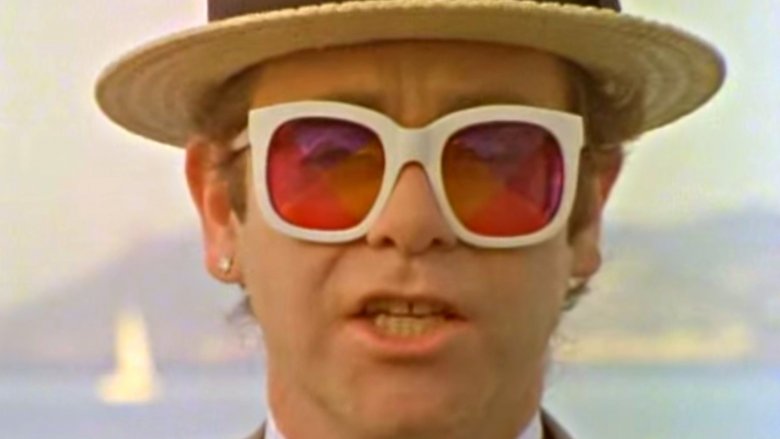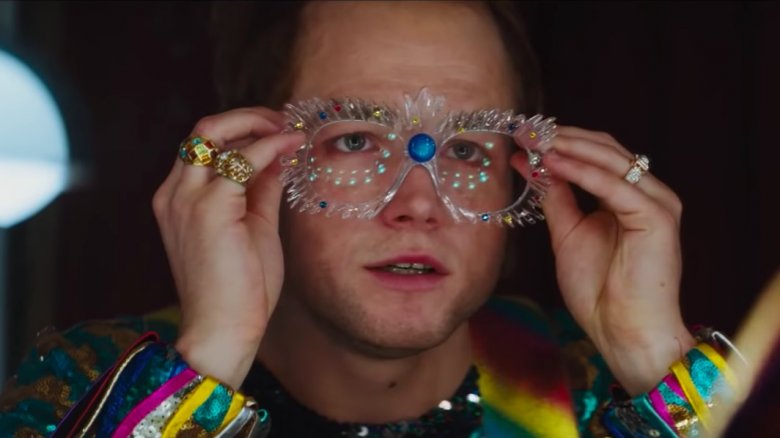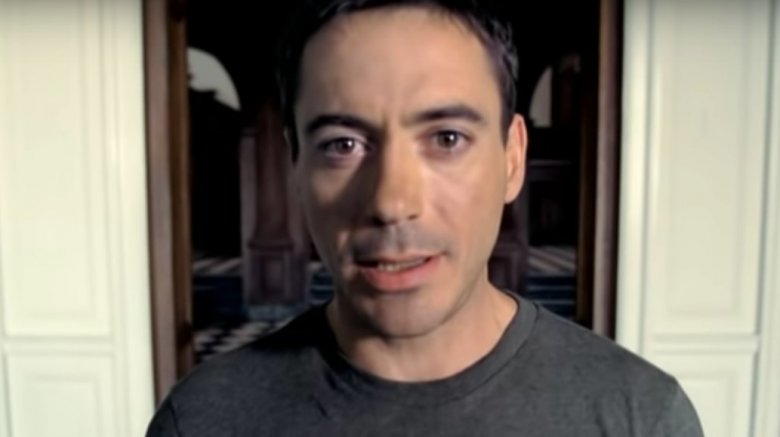Small Details You Missed In Rocketman
Of all the words you'd use to describe Rocketman, "subtle" probably isn't a top choice. The film is as grand, over-the-top, and filled with gaudy fun as the sold-out performances of its subject, singer-songwriter Sir Elton John. Far from being a simple biopic, Rocketman is — in the words of Taron Egerton, who plays John in the film — a "fantasy musical" based on his life. The film focuses on the loneliness of John's early childhood, his rise to fame, and his struggles with addiction. We experience different chapters of John's life through the lens of his hits. We feel the cold of his loveless boyhood home with the 2001 single "I Want Love." When he emerges from rehab at the end of the film, it's to the victorious "I'm Still Standing."
If you go into the film knowing some background info John, then it's easy to understand why Egerton finds it's important to differentiate it from a biopic. Rocketman isn't interested in educating its audience with trivia, but in using fantasy and song to explore the depths to which Elton John sank along with the heights he reached. The filmmakers shamelessly mix fiction and fact, and as a result some details are lost and others are drowned out. Keep reading to learn some of the smaller details you might not know you missed in Rocketman.
Dancing with the devil
The film opens with John walking down a hallway dressed as the devil with darkly feathered wings, a skull cap with top-heavy horns, and a bright orange jumpsuit with sparkled flames. Resting on his nose are one of the who-knows-how-many pairs of eyeglasses Egerton wears in the movie, sporting heart-shaped red lenses. But instead of emerging onstage, John walks right into what appears to be a group therapy circle. He takes a seat and gives us a long list of his ailments — alcoholism, drug addiction, sex addiction, bulimia, and more.
The devil costume is, well, a costume. Its cartoonish extravagance is a symbol of John hiding in the safety of his public persona. The film's story is told through John's admissions in the surreal group therapy sessions. He isn't very honest with the group at first, calling his childhood "quite happy," but his admissions grow more revealing as the film continues. When the story occasionally cuts back to the circle of chairs, we see more of the devil costume stripped away. He loses the wings, he tears off the skullcap and its horns, until eventually all we're left with is Elton John the man in a bathrobe.
At the end of the film, we see split-screen comparisons of John's original costumes and costume designer Julian Day's recreations. The devil costume isn't among them because it's one of the few Day designed from scratch. "I designed [the devil costume] completely from my head," Day told The Independent. "I did find a set of devil horns in Elton's archive, but they're much smaller."
What's in a name?
Elton John was born Reginald Dwight, and as the film depicts, Reggie Dwight knew just as well as everyone else that his name wouldn't do for a rising rock star. As a soul singer tells Reggie early in the film, "You have to kill the person you were born to be in order to become the person you want to be."
In the film, Reggie borrows the first name from one of his Bluesology bandmates, Elton Dean. He's already chosen the new first name Elton while talking to a potential agent, but he doesn't have a last name yet. When asked, he scans the agent's office and spots a photo of the Beatles. A halo of light shines on John Lennon's face and Reggie blurts out "John." Hence, Elton John is born.
That's not quite how it worked in real life. According to the magazine Music Spotlight: Elton John, Reggie Dwight did get the first name of Elton from his bandmate Elton Dean — a saxophonist. But rather than John Lennon, he got his new last name from the not quite as famous English-Canadian blues singer Long John Baldry. While we hear his new middle name — Hercules — a couple of times in Rocketman, the film doesn't offer an origin. According a John biography, it was lifted from a horse on a '60s British sitcom Steptoe and Son.
The forgotten Derf
One of Rocketman's unsung heroes is Fred (Tom Bennett), a man Elton first meets as he's making out with John's still-married mother Sheila (Bryce Dallas Howard) in the front seat of his car. While it's understandable Fred doesn't exactly win Reggie over in the scene, the real man would become a supportive and loving replacement for Reggie's cold and cruel father Stanley (Steven Mackintosh).
In Elizabeth's Rosenthal's biography His Song: The Musical Journey of Elton John, the singer talks about how hurt he was not only by his father leaving the family, but when he started a second family and showed his new children the kind of love John never enjoyed. "He was supposed to hate kids," John says in the biography. In Rocketman we see Stanley openly hugging and holding his young sons, while earlier when young Reggie asks for a hug, his father responds "Don't be soft."
Once John's parents split, his new stepfather Fred not only supported John's dreams in ways Stanley never had, he actually helped the boy get his first paying gig at a local pub. We never hear it in the film, but in real life John nicknamed his stepfather "Derf," i.e. Fred spelled backwards.
Time traveling crocodiles
Part of what makes Rocketman a "fantasy musical" rather than a biopic is the way the filmmakers clearly cared more about which songs served specific parts of the story without getting hung up on the details. A perfect example of this is one of the most pivotal moments in the film and in John's career — his American debut at the Troubadour in L.A.
In Rocketman, a still-unknown Elton John is shaken and almost unwilling to go onstage when his friend and songwriting partner Bernie Taupin (Jamie Bell) blurts out that — in the same club where John is about to perform — he's been rubbing elbows with Neil Diamond and the Beach Boys. Bernie and A&R rep Ray Williams (Charlie Rowe) finally coax him out, and once his fingers hit the ivory he's transformed into a young rock god, tearing down the house with a rendition of "Crocodile Rock."
But any rock history purists may wince watching the scene. As Music Spotlight: Elton John points out, John's Troubadour performance was in 1970, while "Crocodile Rock" wasn't released until late 1972. Regardless, the crowd goes nuts and doesn't seem to mind whether the song arrives in a time machine or not.
Every note
You may not know it or even guess it, but Taron Egerton isn't lip-syncing in Rocketman. As the actor said in a Radio X interview, "every note" is him.
Egerton's singing ability had a lot to do with his casting, though it wasn't the only factor. The possibility of Egerton playing Elton John first came up on the set of Kingsman: The Golden Circle when it was filming in early 2016. On Radio X, Egerton said he met John while the singer was on set for his hilarious cameo in Golden Circle and told him he was "desperate" for the Rocketman role. "At the time, I think, Tom Hardy was attached to [play Elton John]," Egerton said, "but he'd been attached for a long time... so they needed to find someone else."
Egerton had a bit of luck on his side. The animated film Sing was released later in 2016, in which Egerton did the voice of the gorilla Johnny. As Johnny, one of Egerton's tasks was a cover of Elton John's '80s hit "I'm Still Standing." While the conversation about his taking the role in Rocketman had already begun, Egerton said he thinks that performance "sealed the deal."
Still Standing
One could argue that music videos are basically mini-musicals, so you'd be forgiven if you didn't notice anything particularly unique about the final musical number in Rocketman. Once John leaves rehab clean and sober, he does it singing his 1983 hit "I'm Still Standing" from the platinum record Too Low for Zero. We follow John to a beach where he sings amidst a group of dancers. There's nothing strange about that. He's been doing it (minus the beach) the entire film.
Except this isn't just another musical number. The story ends with a painstaking recreation of the actual music video for "I'm Still Standing" directed by Russell Mulcahy, right down to the close-up on Elton John's hand and wristwatch as he snaps along to the beat of the song.
Chronologically speaking, this is another moment of Rocketman that isn't meant to necessarily be taken literally. Shortly after the video recreation, we see a note on the screen pointing out that John has been sober for 28 years, which would go back to 1991 — eight years after the release of "I'm Still Standing." So either John suffered at least one relapse between his departure from rehab and 1991, or he didn't go sober in the '80s. Regardless, you can't argue with the song.
Windows to the soul of a Rocketman
If, as the adage goes, eyes truly are the windows to the soul, then the windows to Elton John's soul change their drapes every few minutes.
Rocketman is full of gaudy, ornate glasses, as Sir Elton seems to have a pair for every outfit. Bob Mackie, who designed many of John's stage costumes in the '70s, told Billboard, "I have no idea how many prescription, diamond-studded and bedazzled pairs he owned, but he certainly had enough to go with everything." He had so many, in fact, that while Mackie designed his costumes, the designer had "no say" in what eyeglasses John wore with the costumes — whatever he chose always seemed to match.
One scene has John proudly showing off a suitcase full of eyeglasses to reporters, and at the end of the film we see this was a recreation of a real photograph. Billboard says the real-life John is rumored to own upwards of 200,000 eyeglasses, and watching Rocketman will not make you doubt that number.
Wanting Love
One of the earliest songs we hear in Rocketman is, ironically, one of the only 21st century Elton John singles in the film. Young Reggie Dwight sings the 2001 hit "I Want Love" along with his father, mother, and his grandmother Ivy (Gemma Jones). The four sing it all in the same small house, all in separate rooms isolated from one another.
The moment carries a particular wrenching emotional weight if you've seen, and remember, the single's music video. Directed by Sam Taylor-Wood in the expansive Greystone Mansion of Beverly Hills, California, "I Want Love" is lip-synched by Robert Downey Jr. in one continuous take.
In 2001, Downey wasn't being cast in blockbusters to solve mysteries in England or fight supervillains for Marvel. He was unfortunately still struggling with substance abuse, and MTV reported when John cast Downey in the video, it was the first acting work he'd been offered since being court ordered into a drug treatment program in July of that year.
Considering John's own battles with substance abuse came from a childhood that spared him no affection or encouragement, and the video for the song was filmed when Downey was still wrestling with the same kinds of demons, it's difficult to not tear up just a little bit when young Reggie starts the song. And it's even more difficult to not feel just a bit of hope when you remember where both John and Downey are now.
